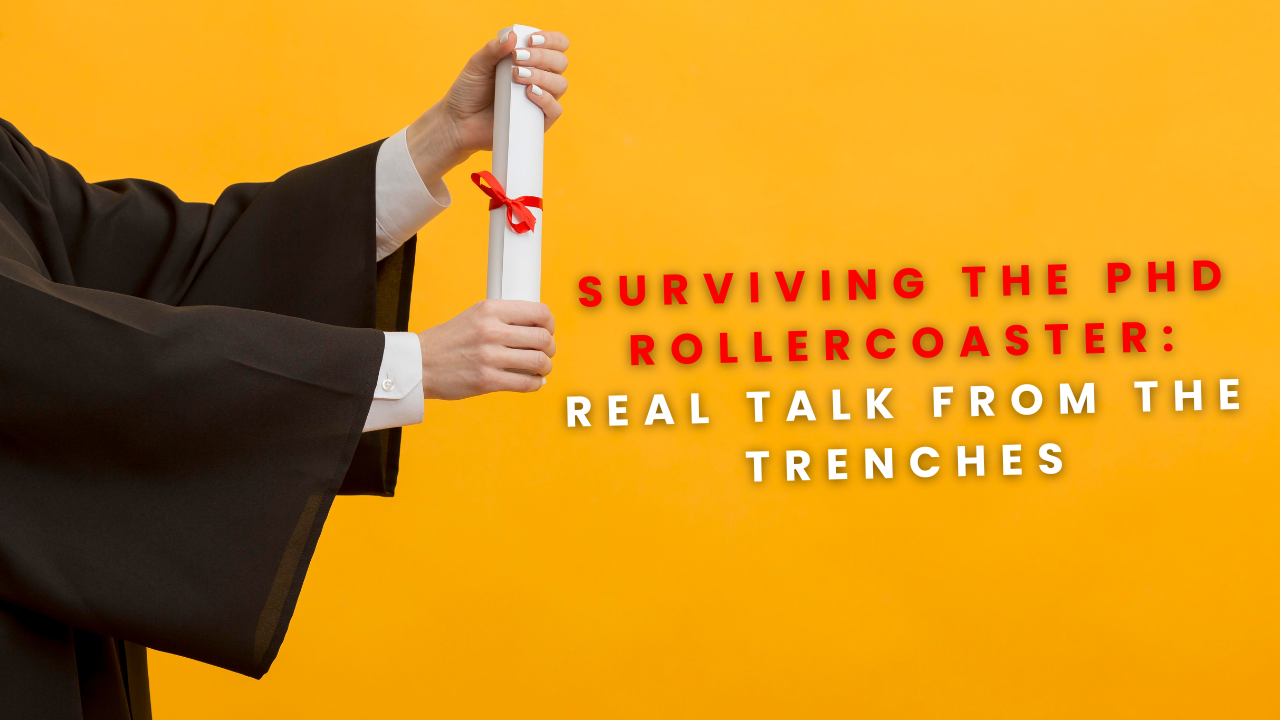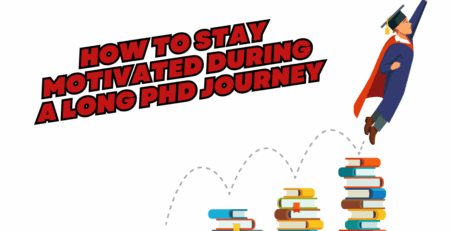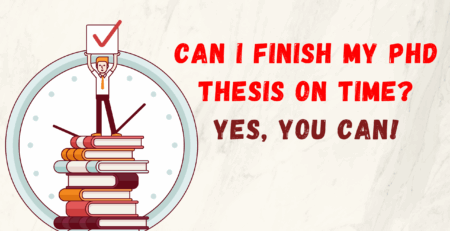Surviving the PhD Rollercoaster: Real Talk from the Trenches
Kenfra Research - Shallo2025-04-21T16:07:43+05:30Pursuing a PhD is like riding a rollercoaster — thrilling, terrifying, exhilarating, and sometimes even nausea-inducing. It’s a journey filled with peaks of intellectual satisfaction and valleys of self-doubt. If you’re somewhere in the middle of this academic adventure (or considering embarking on it), let’s get real. This isn’t your typical “stay positive and work hard” blog. This is real talk from the trenches — what it actually takes when it comes to Surviving the PhD Rollercoaster. Whether you’re pursuing a doctorate in engineering, social sciences, life sciences, or humanities, these raw, experience-based insights will help you navigate the ups and downs of PhD life. Surviving the PhD Rollercoaster isn’t just about persistence — it’s about strategy, support, and a little bit of sanity. So buckle up — here’s your survival guide.

The Emotional Rollercoaster: It’s Real
Let’s start with the mental and emotional toll. One of the biggest challenges of a PhD isn’t necessarily the research itself — it’s dealing with the intense emotional rollercoaster that comes with it.
Impostor Syndrome Hits Hard
You’re not alone if you’ve ever thought: “I don’t belong here.” Almost every PhD scholar experiences impostor syndrome at some point. You’re surrounded by brilliant minds, and the pressure to constantly prove your worth can be overwhelming.
How to cope:
- Keep a “success file” — a collection of achievements, compliments from peers, and positive feedback from your supervisor.
- Talk to peers. Chances are, they’re feeling the same way.
The Isolation is No Joke
PhD research is often a solo mission. Days can go by without any meaningful interaction, especially if you’re buried in data analysis or writing.
Survival tip:
- Join writing groups or research communities online and offline.
- Schedule regular check-ins with fellow PhD candidates or mentors.
The Academic Pressure Cooker
Getting published in reputed journals, meeting your supervisor’s expectations, and working on complex problems can put you under immense pressure. Add tight deadlines, grant applications, and conference presentations, and the stress level can skyrocket.
Dealing with Deadlines and Burnout
Late nights and coffee-fueled marathons might be romanticized in academic circles, but they’re not sustainable. Burnout is real, and it sneaks up on you.
Preventive measures:
- Set realistic daily and weekly goals.
- Take scheduled breaks — you’re a human, not a research machine.
- Don’t be afraid to say no to extra responsibilities that interfere with your progress.
Rejection is Part of the Game
Failed experiments. Harsh reviewer comments. Rejected papers. These are not signs of failure — they’re part of the PhD journey. Every researcher has faced rejection — even the most published and celebrated ones.
Mental reframing:
- View rejection as redirection. Every failed experiment is a step closer to figuring out what works.
- Learn from reviewer feedback and revise with a growth mindset.
Supervisors Can Make or Break the Experience
Your relationship with your supervisor(s) is one of the most crucial elements of your PhD life. A supportive mentor can elevate your work and boost your morale. A difficult one can drain your enthusiasm.
How to Handle Supervisor Challenges
If communication is strained or expectations aren’t clear, problems can escalate fast.
Tactics that work:
- Document meetings and feedback in writing.
- Be assertive, not aggressive. Communicate your challenges respectfully and suggest solutions.
- Seek help from your department if issues persist.
Time Management: Your Best Friend and Worst Enemy
PhD students often juggle multiple roles — researcher, teaching assistant, conference speaker, and sometimes even full-time employee or parent.
Mastering the Art of Time Blocking
Time blocking can be a game-changer. Instead of just listing tasks, assign specific time slots to each activity.
Pro tips:
- Use tools like Google Calendar, Notion, or Trello to organize your day.
- Identify your peak productivity hours and protect them fiercely.
- Dedicate time to reading and staying updated in your field — it’s easy to neglect when deadlines loom.
Staying Motivated When the Spark Fades
Enthusiasm tends to fluctuate over the course of a PhD. The initial excitement can fade as the work becomes repetitive or hits roadblocks.
Strategies to Reignite Your Passion
- Revisit your “why”: Why did you start this journey in the first place?
- Celebrate small wins: Finished a chapter? Solved a bug in your code? Celebrate it.
- Switch tasks: If you’re stuck, move to another part of your research or take a creative break.
- Talk to others in your field: Discussions can lead to new ideas and renewed energy.
Community Matters: Don’t Do It Alone
Isolation is the breeding ground for burnout and self-doubt. Engaging with a supportive academic community can keep you grounded and energized.
Build Your Tribe
- Attend academic conferences and workshops (even virtually).
- Join PhD forums, online research groups, or campus societies.
- Connect with people on platforms like LinkedIn, Twitter/X, or ResearchGate.
Wellness Isn’t Optional
A common PhD myth is that if you’re not stressed and sleep-deprived, you’re not working hard enough. This toxic mindset needs to go.
Prioritize Your Health
- Sleep: Non-negotiable. Productivity plummets with sleep deprivation.
- Exercise: Even a 20-minute walk can boost creativity and reduce stress.
- Mindfulness: Meditation, journaling, or simply unplugging for a while can improve mental clarity.
The Light at the End of the Tunnel
Yes, the PhD rollercoaster has sharp turns, dark tunnels, and moments that feel like free fall. But it also brings unmatched personal and professional growth.
You’ll develop:
- Critical thinking and analytical skills
- Resilience and perseverance
- Subject mastery that can position you as a thought leader in your field
And yes — that moment when you submit your thesis or successfully defend it? It’s worth it.
Final Thoughts: You’re Not Alone
The PhD journey isn’t a straight path. It’s messy, non-linear, and deeply personal. But you don’t have to go through it in silence or solitude. Ask for help. Build your support network. Celebrate your progress. Learn from failure. Keep showing up. Whether you’re just starting or struggling somewhere in the middle, remember this: Surviving the PhD Rollercoaster means embracing the chaos and finding strength in the struggle. You’re not alone — and Surviving the PhD Rollercoaster is absolutely possible. You’re doing better than you think.
Kenfra Research understands the challenges faced by PhD scholars and offers tailored solutions to support your academic goals. From topic selection to advanced plagiarism checking.










Leave a Reply